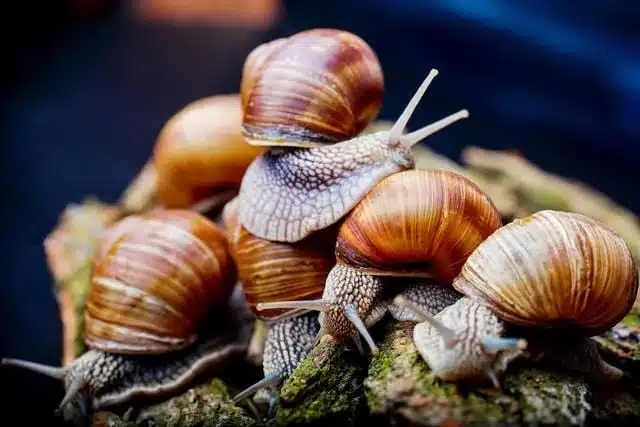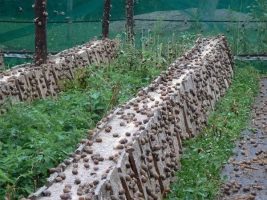Our people believe that eating snails is for the rich. If snail was meat for the rich, why can’t it be a business for the poor? having gathered enough research, I will be walking you through the requirements to start a small-scale snail farming business in Nigeria that yields profit.
Biologically, snails belong to the class in the animal kingdom called Gaspropoda: The class gastropoda includes slugs and snails. The majority have a shell that the animal can withdraw its body into and are called snails.
Further classification places them under the Phylum; Mollusca which are the second largest invertebrate animals.
Let me not bore you with further Biological grammar. (I enjoyed Biology in my school days though)
Snail Farming is a profitable business in Nigeria to venture into that requires a small amount of capital. One interesting part of it is that the business is under-exploited meaning there is little to no competition
How many snail farmers do you know in Nigeria?
This is not to say Snails are not consumed in Nigeria. The fact remains that the lucrative nature of this business is not getting the attention and respect it deserves.
Snail Farming Overview
Snail farming is an agribusiness practice also called Heliculture that involves the breeding and rearing of snails for both subsistence and commercial purposes.
Whether small-scale or large-scale farming, there are certain practices you must adhere to to record tremendous amounts of success in this business venture.
Research has it that the annual demand for snails in Nigeria has been pegged to be at about 7.5 million kg per year and the price of a medium-sized snail is about ₦400 – ₦900 depending on the size.
Start Small-Scale Snail Farming in Nigeria (7 Things I’ll Do)
Below are considerable factors and ways you can start a small-scale (subsistence snail farming in Nigeria). These strategies are exactly what I’ll do if I should venture into this business.
1. Understand and Select the Suitable Snail Breed
There are various species of snails. Just as we have white agric fowls and our local domestic fowls. Snails have a variety of species you can pick from.
There are over 4000 species of snails out there, broadly classified as land snails, freshwater snails, and sea snails. Land Snails.
Despite the diversity, species such as Achatina achatina are the most popularly known and grown in warm climate regions like Africa.
Above is a pictorial representation of the Odogwu snail in Africa.
Other snail species that could be good options include; the Burgundy snail (Helix pomatia), the garden snail (Cornu aspersum), the white garden snail (Theba pisana), and the milk snail (Otala lacteal).
2. Set up A Conducive Snail Farm and Housing
Just like human beings, snails need comfort and serene areas to thrive and grow well. Without a conducive environment, your snails will not give you the highest yield.
Snails are reared in small pens which are often covered with nests and fenced to protect thieves from breaking in.
The size of the snail also determines the nature of its housing. Overcrowding your snailery impedes the development of snails and therefore should be avoided. A well-spaced snail housing reduces the risk of disease outbreaks caused by overcrowding.
Just like other animals like goats and chickens, snails have the habit of escaping their cage or housing, so you should ensure to cover all tiny holes that could give freedom for your snails to crawl out.
Lastly, your pens should be covered in nests and not blocked out to allow ventilation inside the pens.
Below are essential things that must be present in your snail farm
- Water
- Fruits
- Shovel
- Staple gun
- Wooden posts
- Fencing material
- Net
- Sandy-loam soil
Alternatively, you can also rear snails in a bucket but only if you can meet the soil requirements as well as a secure environment away from dogs and cats.
3. Get the Best Soil Type for Easy Breeding
We all know that without good soil fertility, plants and animals that live inside the soil can not thrive.
The soil is the snails’ primary habitat and is essential for their survival because of the organic nutrients present in it.
If I were to start my snail farming business, I would go for sandy-loamy soil because of the high level of organic matter it contains. This type of soil is also a suitable place for snails to lay their eggs and drink water because of its balance.
4. Buy Snails from a Supplier
After setting up proper housing and farmland for the snails, it’s time to buy some fresh quality snails from the market or any farm.
You can look at for suppliers that will supply you with baby snails to bring to your farm to grow.
It’s always best to be able to examine the snails before you buy them so that you know they are healthy.
When you first start your snail farm, you’ll want to get healthy, fully-grown snails that will lay eggs and help populate your farm.
One way you can identify a matured snail is through the lip of the shell.
Where to Buy Snails for Farming in Nigeria
With the rise in technology, you don’t always need to travel out of your comfort zone to buy products. You can always have them delivered to you
These websites offer the best snails at the most affordable prices in the market
eFarmers
Betaprices
Agrocycle
Egoic Snail farm
You can also purchase snails via affordable vendors in Lagos markets.
5. Feeding
Snails commonly feed on meal leftovers and green leaves without salt. Calcium is also vital for the growth of their shells as it helps to develop stronger shells. So ensure you add limestone, and egg shells to their feeds.
These invertebrate animals are highly vegetarians in nature so you should also consider this when getting their feeds.
They also feed on other meals like watermelon, corn, pap, beans, and rice, all without salt.
There is also a period in the growing stage of snails in the first 6 to 7 months where they go into hibernation (at this point they will not feed) until the next rainy season.
This hibernation period is when snails mate and reproduce having grown into a point of lay.
6. Reproduction
Snails are intersex beings in nature; they possess both male and female reproductive organs. This means you won’t be stressing yourself trying to get male and female snales together to mate and reproduce.
Mating and laying eggs are a vital part of snail farming. Typically, mating occurs during spring and summer.
As hermaphrodites, snails can fertilize each other as soon as they are mature enough. For the egg laying to go over smoothly, you should use high-quality soil with the right temperature and humidity.
There is no specific breeding period for snails, but you can expect anything from 5 to 6 clutches of eggs yearly. In each clutch, there’s an average of 200 eggs, only if you place them under suitable conditions.
7. Harvesting of Snails for Consumption
On average, it takes a minimum of 2 years for snails to grow into table size for selling and consumption. Experts advise that you only harvest when the snails are mature and ready.
They are best harvested with the use of baskets, boxes, bowls, and containers.
It is also wise that you keep some leftovers on the farm for future breeding otherwise you will end up selling all your snails.
Snails have a good market demand and price. You can easily sell the snails in the local market. The snail meat consumption rate is growing very fast around the globe. So, exporting in the international market can make you more money.
The snail market is mostly at its peak of availability during March and April of the year. It is mostly consumed in States like Akwa Ibom, Oyo, Lagos, Cross River, Ogun, Benue, Rivers and Edo
Cost to Start A Small-Scale Snail Farming Business in Nigeria
When planning to start a snail farming business in Nigeria (e.g in a small scale) you will have to consider a good budget that will accommodate things like housing, feeding, buying snails from a supplier, marketing and logistics as well as other expenses that could arise.
According to experts, you can start a small-scale farming business in Nigeria with a capital between ₦300,000 to ₦500,000. (This estimate is done in acknowledgement of the wave of inflation)
Another interesting factor is the availability of prolific Achatina achatina species of snails, which are capable of laying between 200 to 400 in one batch of eggs 2 to 3 times a year.
If you produce 100,000 snails that sell for ₦250 each, which is ₦250 X 100,000, you will be making ₦2,500,000. You will be making ₦25,000,000 yearly or more than that if you produce 1,000,000 snails.
- Read Also: Poultry farming in Nigeria
How Much is 1kg Snail in Nigeria Now
The current cost of 1kg of frozen snail ranges from ₦9,00 to ₦15,000
The Secret of Snail Farming
As a farmer, here are secrets to running a successful snail farming business. These are strategies used by successful farmers who have been in the snail business for a long
- Allowing snails to grow into full maturity
- Understanding the market needs and customers
- Strategic marketing
- Proper housing, feeding and accommodation
- Seamlessly logistics to transport snails across different locations
Profitability of Snail Farming
Snails are highly profitable. According to a study, snails can be sold for ₦50 and as high as ₦1,200 per piece. So this business has the potential to earn you between ₦2,000,000 to ₦5,000,000 after 2 years if it is well-planned
Problems of Snail Farming in Nigeria
According to research and reviews gathered from various farmers who do snail farming in Nigeria, below are common challenges facing the business venture
1. Predators
2. Poor soil quality
3. Rising cost of snail feeds
4. Change in climate
5. Disease and pest
Snail Disease and Treatment in Nigeria
One of the most common diseases in snails is Schistosomiasis which affects not only animals but even humans.
There have been multiple reports that there is no vaccine for Schistosomiasis. However, there are certain drugs that you can mix with water and in snail feed to help fight against such diseases.
Schistosomiasis is feared to be the major cost of death of snails on farms. They also suffer from bacterial and fungal infections
Read Also:
Sites to Sell Farm Produce in Nigeria
Conclusion:
In conclusion, to start small scale snail farming in Nigeria, you need to conduct proper market research, get good housing and farm with suitable soil to habitat your snails, gather your snails together and feed them until they reach market size.
In addition to that, care should be taken and effective measures should be put in place to tackle disease and other factors that could impede the success of your snail farm.

Legacy Benjamin is a serial SEO content writer with a half-decade of experience in the field of blogging. He is also a skilled business consultant, providing valuable insights to companies and individuals seeking growth and success. His expertise lies in crafting compelling and engaging content that captivates audiences and drives business results. For business deals, contact him



